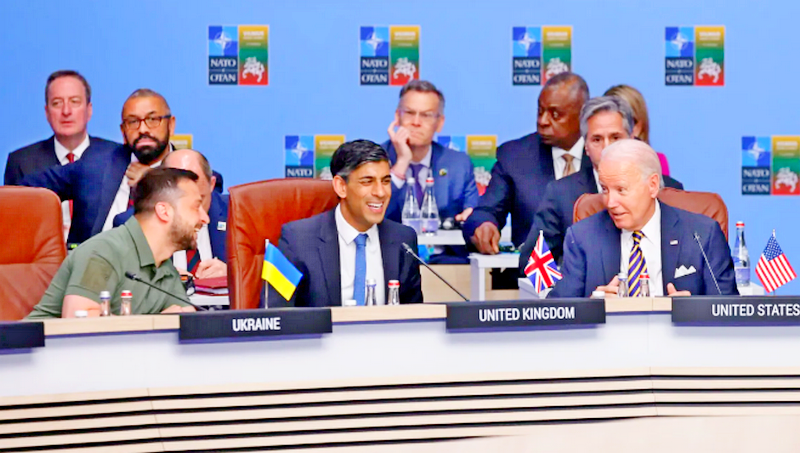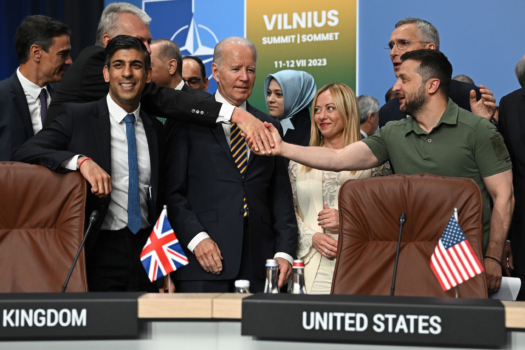Biden Pledges ‘Israel-Style’ Security Guarantees to Ukraine During Meeting with Zelenskyy, G–7 Leaders

By The Epoch Times - Emel Akan - July 12, 2023
VILNIUS, Lithuania—President Joe Biden met with Group of Seven (G–7) leaders on July 12 at the North Atlantic Treaty Organization (NATO) summit to offer security assistance for Ukraine in its fight against Russia.
Ukrainian President Volodymyr Zelenskyy also joined the meeting, during which the G7 leaders issued a “Joint Declaration of Support for Ukraine.”
This joint declaration will “make it clear that our support will last long into the future,” Mr. Biden announced after the conclusion of the meeting.
“We’re going to help Ukraine build a strong capable defense, across land, air, and sea,” he added, noting that this step will ensure regional stability and avert all threats.
“I think it’s a powerful statement, a powerful statement of our commitment to Ukraine, as it defends its freedom today and as it rebuilds the future and we’re going to be there as long as that takes,” Biden concluded.
Before the summit, the White House indicated that Ukraine could receive “Israel-style” security guarantees in its fight against Russia.
That means the United States would “provide various forms of military assistance, intelligence and information sharing, cyber support, and other forms of material support so that Ukraine can both defend itself and deter future aggression,” Mr. Sullivan briefed reporters on July 9.
As part of this declaration, Biden explained that each country will individually negotiate long-term bilateral security arrangements with Ukraine.
“Ukrainian delegation is bringing home significant security victory for the Ukraine, for our country, for our people, for our children,” Zelenskyy said after the event.
Biden later met with Zelenskky in a bilateral discussion, during which he said that Russia’s invasion of Ukraine is straight out of the 14th century and praised his courage and resilience.
Biden acknowledged Zelenskyy’s frustration with the slow pace of U.S. assistance.
“But I promise you,” Biden said, “The United States is doing everything we can to get you what you need as rapidly as we can.”
Ukraine’s Path to NATO Membership
The announcement of security guarantees came after Zelenskyy expressed frustration about the NATO communiqué released on July 11 that failed to provide a timeline for Ukraine’s accession to the military alliance.
Zelenskyy criticized the alliance during the summit, calling the decision “unprecedented and absurd.”
Leaders of NATO member countries participating in this year’s summit in Vilnius issued a communiqué on July 11, stating that Ukraine can join the military alliance “when Allies agree and conditions are met.”
“Ukraine’s future is in NATO,” the Communiqué (pdf) noted. However, the alliance demands more democratic and security reforms from Kyiv before it can join.
Ukraine was a key topic of discussion at this year’s summit, with allies debating the country’s future membership and further aid to the war-torn nation. However, there was a wide range of views among allies in the months leading up to the meeting over Ukraine’s eventual membership.
The United States, Germany, and the southern NATO partners have been more cautious about Ukraine’s membership, while the Baltic states and Eastern European nations like Poland hold the most hawkish and assertive stance.
White House Defends NATO Communiqué
In response to Zelenskyy’s message, the White House on July 12 defended NATO’s decision, noting that it sends a “very strong, forward-leaning message” for Ukraine.
“I would agree that the communiqué is unprecedented, but I see that in a positive way,” Amanda Sloat, White House National Security Council senior director for Europe, told reporters on July 12.
“We joined with Allies yesterday in agreeing to a very strong, positive message. We reaffirmed that Ukraine will become a member of the NATO Alliance,” she said.
The allies reaffirmed their commitment made at the 2008 Bucharest Summit and acknowledged that Kyiv has made “substantial progress on its reform path.”
In the communiqué, NATO also removed the requirement that Ukraine implement a so-called Membership Action Plan.
Instead, the members have decided to form the “NATO-Ukraine Council,” a new joint organization in which allies and Ukraine sit as equal members to further political dialogue and cooperation.
They’ve also adapted an “Annual National Program” to review progress on a regular basis.

“In our view, this is a very strong, forward-leaning message that moves significantly beyond what has been said in the past, in terms of Bucharest,” Ms. Sloat added.
She said that the G–7 allies would continue to provide Kyiv with ongoing security assistance to help Ukraine both on the battlefield and on the economic and humanitarian side.
However, the decision disappointed Zelenskyy.
“It’s unprecedented and absurd when a time frame is not set neither for the invitation nor for Ukraine’s membership. While at the same time vague wording about ‘conditions’ is added even for inviting Ukraine,” he wrote on Twitter on July 11.
Mr. Zelenskyy also said Ukraine “deserves respect” and criticized the communiqué’s phrasing for being “discussed without Ukraine.”
National Security Advisor Jake Sullivan reiterated Mr. Biden’s position that admitting Ukraine to NATO would result in conflict with Russia.
“Look, I understand Ukraine’s desire to be in the NATO as fast as possible. That is absolutely their right to seek admission, and press for it, and to advocate for it,” he told CNN on July 12.
“But every NATO ally, including the United States, needs to look squarely at the fact that admission of Ukraine into NATO at this juncture means war with Russia, that is an inescapable fact,” he said.
Sullivan also stated that for Ukraine’s membership, the allies could not “put a mechanical formula down because war is dynamic, the situation is dynamic.”

Journalist Emel Akan - The Epoch Times

